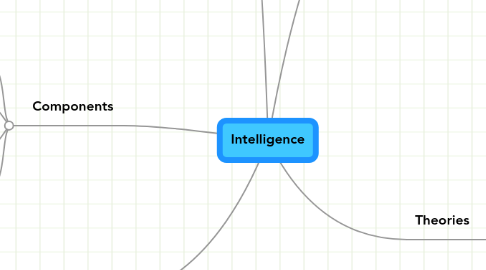
1. Components
1.1. Learning Ability
1.1.1. If you are intelligent in certain domains people are more likely to lean new information and behaviors more quickly and easily than those who are not
1.2. Prior Knowledge
1.2.1. Analyze and understand new situations
1.3. Interaction/Coordination
1.3.1. Many different processes
1.4. Adaptive
1.4.1. Flexibility to respond to different situations and problems
2. Children and intelligence
2.1. Heredity
2.2. Environmental
2.3. Experiences
3. Questions/Critiques
3.1. Relied too heavily on traditional intelligence tests
3.2. IQ scores interpreted out of context
3.3. Tests focus on skills that are in mainstream Western culture
3.4. Test ovelook dispositions and metacognitive strategies as important contributors to intellectual functioning
3.5. Priority on assessing current intelligence than on developing future intelligence
4. Definition
4.1. The ability to learn and accomplish new and different tasks
5. Theories
5.1. Spearman's g
5.1.1. Performance on a given task depend both on the general factor and on specific factors that may be involved in the task
5.2. Gardner
5.2.1. Several specific abilities
5.2.1.1. Multiple Intelligences
5.2.1.1.1. Linguistic
5.2.1.1.2. Logical-mathematical
5.2.1.1.3. Spatial
5.2.1.1.4. Musical
5.2.1.1.5. Bodily-kinesthetic
5.2.1.1.6. Naturalist
5.2.1.1.7. Intrapersonal
5.2.1.1.8. Interpersonal
5.3. Stenberg
5.3.1. Three factors
5.3.1.1. Enviromental context
5.3.1.2. Prior experiences
5.3.1.3. Cognitive processes
5.4. Cattell's
5.4.1. Fluid Intelligence
5.4.1.1. Ability to acquire knowledge quickly and adapt to new situations
5.4.2. Crystallized Intelligence
5.4.2.1. Knowledge and skills from past experiences and schooling
